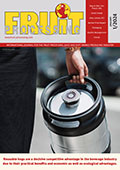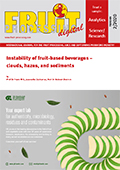Tetra Pak commits to net zero emissions
Tetra Pak reconfirms its strategic priority in driving the sustainability transformation by setting an ambition for net zero emissions across the value chain by 2050, supporting this with an intermediate 2030 target of net zero carbon emissions across its own operations.

The company announces commitment to reach net zero greenhouse gas (GHG) emissions in its own operations by 2030, with the ambition to achieve net zero GHG emissions for the entire value chain by 2050
Tetra Pak reconfirms its strategic priority in driving the sustainability transformation by setting an ambition for net zero emissions across the value chain by 2050, supporting this with an intermediate 2030 target of net zero carbon emissions across its own operations. The company will also set emissions reduction targets in line with 1.5°C according to the Science Based Targets (SBT) initiative across scopes 1, 2 and 3.
Tetra Pak was founded on the idea that a package should save more than it costs, with sustainability always at the core of how the company operates as a business. Since 1999, the company has been collecting data on energy use and greenhouse gas emissions from across the organisation on an annual basis, with its GHG accounts audited by an independent third party since 2013.

Lars Holmquist, Executive Vice President Packaging Solutions and Commercial Operations at Tetra Pak, said: “We have consistently delivered on our climate goals, right from the first goal set in 2002, again in 2005 and we are on track to meet our 2020 goal. In 2017, we were the first company in the food and beverage industry to have our climate impact reduction targets approved by the SBT initiative. More recently, we joined the European Alliance for Green Recovery, the first pan-European call for mobilisation on post-crisis green investment solutions. Today, we’re once again leading the way by setting ambitious net zero emissions targets that will drive transformation right across our sector and the entire value chain. The planet’s greatest environmental challenge demands nothing less from us.”
Tetra Pak will focus on four key areas to reach net zero GHG emissions across its own operations by 2030, and to realise its 2050 ambition along the entire value chain:
- Lowering energy-related emissions through energy conservation, improvements in energy efficiency, installing on site solar photovoltaics (solar PV) and purchasing renewable energy. Since 2011, Tetra Pak has invested over €16 million in energy efficiency, preventing energy use from increasing by 23% over this period. To date the company has installed approximately 2.7 MW of solar PV (or about 8000 panels), delivering low carbon electricity whilst saving operational costs. A member of the RE100 initiative, Tetra Pak has gone from 20% use of renewable electricity in 2014 to 69% in 2019, and it is on track to achieve its 2020 target of 80%. This journey included the installation of solar panels across its operations and the purchasing of renewable certificates, with the company being one of the first to do so in countries such as Thailand and South Africa.
- Partnering with suppliers and other stakeholders along the value chain to significantly reduce carbon footprint. Tetra Pak is working with suppliers to cut upstream carbon emissions, including setting ambitious renewable energy targets and increasing the use of renewable and recycled materials, which are critical to make a low carbon circular economy possible.
- Accelerating the development of its low carbon circular packaging and equipment portfolio and working to help customers achieve their emission reduction targets. A step change in investment levels in sustainable innovation is helping the company to realise its ambition of a fully recyclable package made solely from renewable or recycled materials as well as to offer processing and packaging lines with minimal carbon footprint.
- Developing sustainable recycling value chains, via collaboration with customers, waste management companies, recyclers, municipalities, industry associations and equipment suppliers. Tetra Pak’s vision is that all beverage cartons can be collected for recycling, and zero beverage cartons become litter or are sent to landfill.
Lars Holmquist concluded: “Ten years ago we set a climate goal to cap our 2020 impact across the value chain at 2010 levels, while growing the business. This helped us save 12 million tonnes of GHG emissions to date. We believe that our ability to set and demonstrate progress in line with science and societal expectations, our innovation drive and the collaborative approach across the value chain put us all on the right path to achieve our new ambition.”









